ACC520 Legal Regulation of Business Structures: Corporations Act 2001
VerifiedAdded on 2023/06/04
|8
|2487
|398
Case Study
AI Summary
This assignment provides a detailed legal analysis of business structures under the Corporations Act 2001. It examines scenarios involving changes to a company's constitution, expropriation of shares, and contractual obligations. The first part discusses the regulations related to altering a company's constitution, focusing on shareholder rights and the implications of minority shareholders' interests, particularly in the context of expropriating shares as illustrated by the Gambotto v WCP Limited case. The second part delves into pre-incorporation contracts and contractual remedies, emphasizing the obligations and liabilities arising from ratified contracts, referencing Section 131 of the Corporations Act 2001. Additionally, the assignment explores directors' duties, including the duty of care and diligence (Section 180), acting in good faith (Section 181), and the proper use of position and information (Sections 182 and 183), citing relevant case laws like ASIC v Adler and ASIC v Vizard. The analysis covers scenarios where directors breach their duties by prioritizing personal interests over the company's and misusing information for personal gain. The assignment concludes by summarizing the legal implications and available remedies for the involved parties.
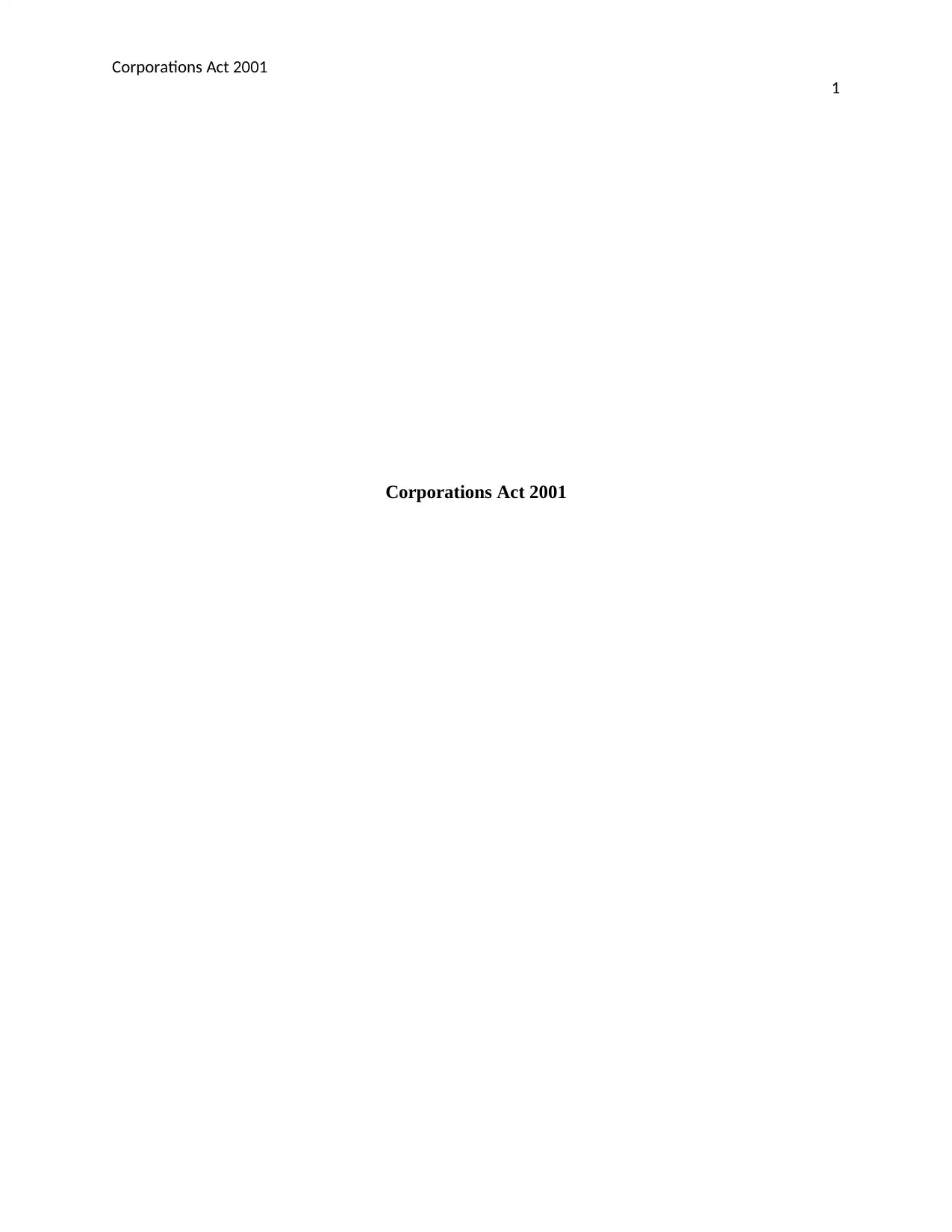
Corporations Act 2001
1
Corporations Act 2001
1
Corporations Act 2001
Paraphrase This Document
Need a fresh take? Get an instant paraphrase of this document with our AI Paraphraser
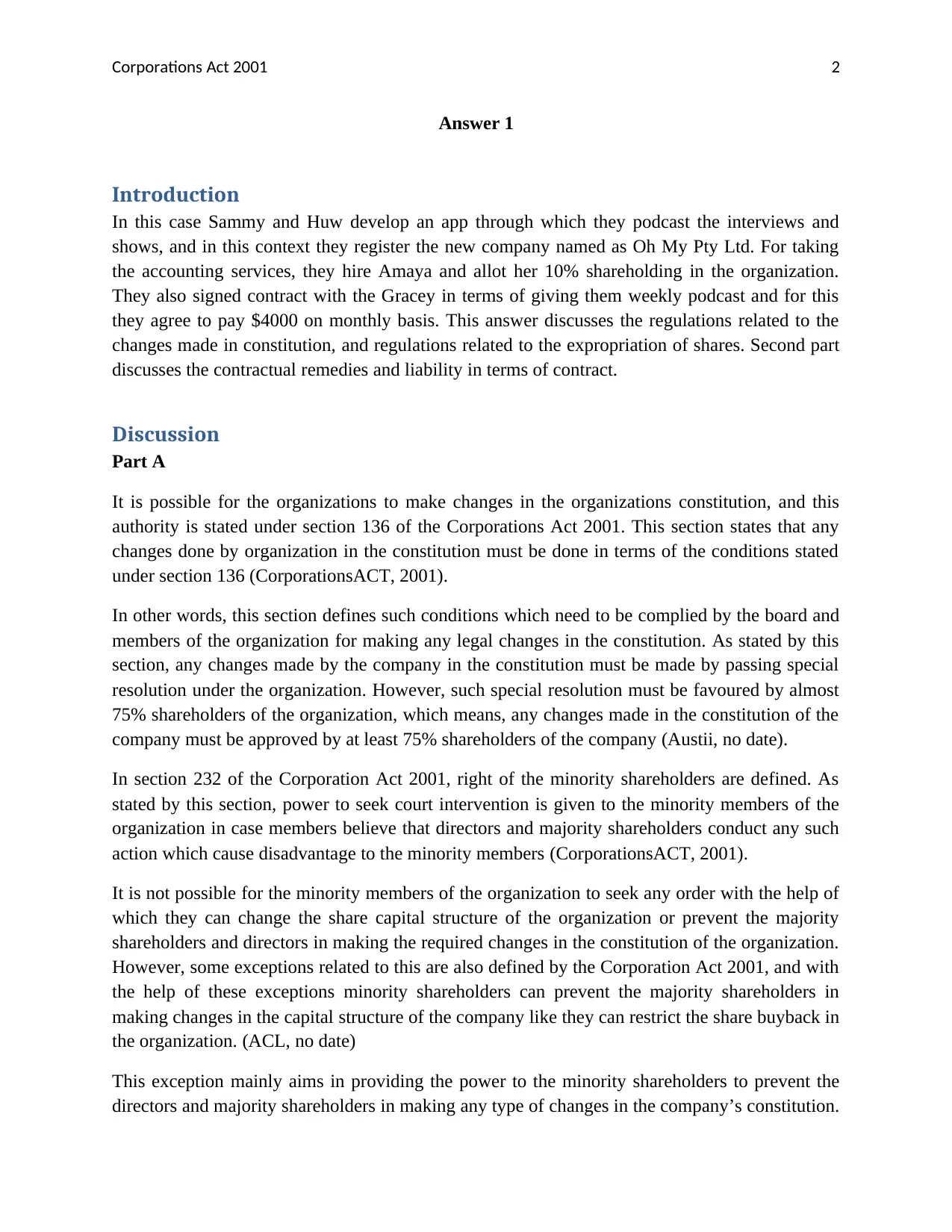
Corporations Act 2001 2
Answer 1
Introduction
In this case Sammy and Huw develop an app through which they podcast the interviews and
shows, and in this context they register the new company named as Oh My Pty Ltd. For taking
the accounting services, they hire Amaya and allot her 10% shareholding in the organization.
They also signed contract with the Gracey in terms of giving them weekly podcast and for this
they agree to pay $4000 on monthly basis. This answer discusses the regulations related to the
changes made in constitution, and regulations related to the expropriation of shares. Second part
discusses the contractual remedies and liability in terms of contract.
Discussion
Part A
It is possible for the organizations to make changes in the organizations constitution, and this
authority is stated under section 136 of the Corporations Act 2001. This section states that any
changes done by organization in the constitution must be done in terms of the conditions stated
under section 136 (CorporationsACT, 2001).
In other words, this section defines such conditions which need to be complied by the board and
members of the organization for making any legal changes in the constitution. As stated by this
section, any changes made by the company in the constitution must be made by passing special
resolution under the organization. However, such special resolution must be favoured by almost
75% shareholders of the organization, which means, any changes made in the constitution of the
company must be approved by at least 75% shareholders of the company (Austii, no date).
In section 232 of the Corporation Act 2001, right of the minority shareholders are defined. As
stated by this section, power to seek court intervention is given to the minority members of the
organization in case members believe that directors and majority shareholders conduct any such
action which cause disadvantage to the minority members (CorporationsACT, 2001).
It is not possible for the minority members of the organization to seek any order with the help of
which they can change the share capital structure of the organization or prevent the majority
shareholders and directors in making the required changes in the constitution of the organization.
However, some exceptions related to this are also defined by the Corporation Act 2001, and with
the help of these exceptions minority shareholders can prevent the majority shareholders in
making changes in the capital structure of the company like they can restrict the share buyback in
the organization. (ACL, no date)
This exception mainly aims in providing the power to the minority shareholders to prevent the
directors and majority shareholders in making any type of changes in the company’s constitution.
Answer 1
Introduction
In this case Sammy and Huw develop an app through which they podcast the interviews and
shows, and in this context they register the new company named as Oh My Pty Ltd. For taking
the accounting services, they hire Amaya and allot her 10% shareholding in the organization.
They also signed contract with the Gracey in terms of giving them weekly podcast and for this
they agree to pay $4000 on monthly basis. This answer discusses the regulations related to the
changes made in constitution, and regulations related to the expropriation of shares. Second part
discusses the contractual remedies and liability in terms of contract.
Discussion
Part A
It is possible for the organizations to make changes in the organizations constitution, and this
authority is stated under section 136 of the Corporations Act 2001. This section states that any
changes done by organization in the constitution must be done in terms of the conditions stated
under section 136 (CorporationsACT, 2001).
In other words, this section defines such conditions which need to be complied by the board and
members of the organization for making any legal changes in the constitution. As stated by this
section, any changes made by the company in the constitution must be made by passing special
resolution under the organization. However, such special resolution must be favoured by almost
75% shareholders of the organization, which means, any changes made in the constitution of the
company must be approved by at least 75% shareholders of the company (Austii, no date).
In section 232 of the Corporation Act 2001, right of the minority shareholders are defined. As
stated by this section, power to seek court intervention is given to the minority members of the
organization in case members believe that directors and majority shareholders conduct any such
action which cause disadvantage to the minority members (CorporationsACT, 2001).
It is not possible for the minority members of the organization to seek any order with the help of
which they can change the share capital structure of the organization or prevent the majority
shareholders and directors in making the required changes in the constitution of the organization.
However, some exceptions related to this are also defined by the Corporation Act 2001, and with
the help of these exceptions minority shareholders can prevent the majority shareholders in
making changes in the capital structure of the company like they can restrict the share buyback in
the organization. (ACL, no date)
This exception mainly aims in providing the power to the minority shareholders to prevent the
directors and majority shareholders in making any type of changes in the company’s constitution.
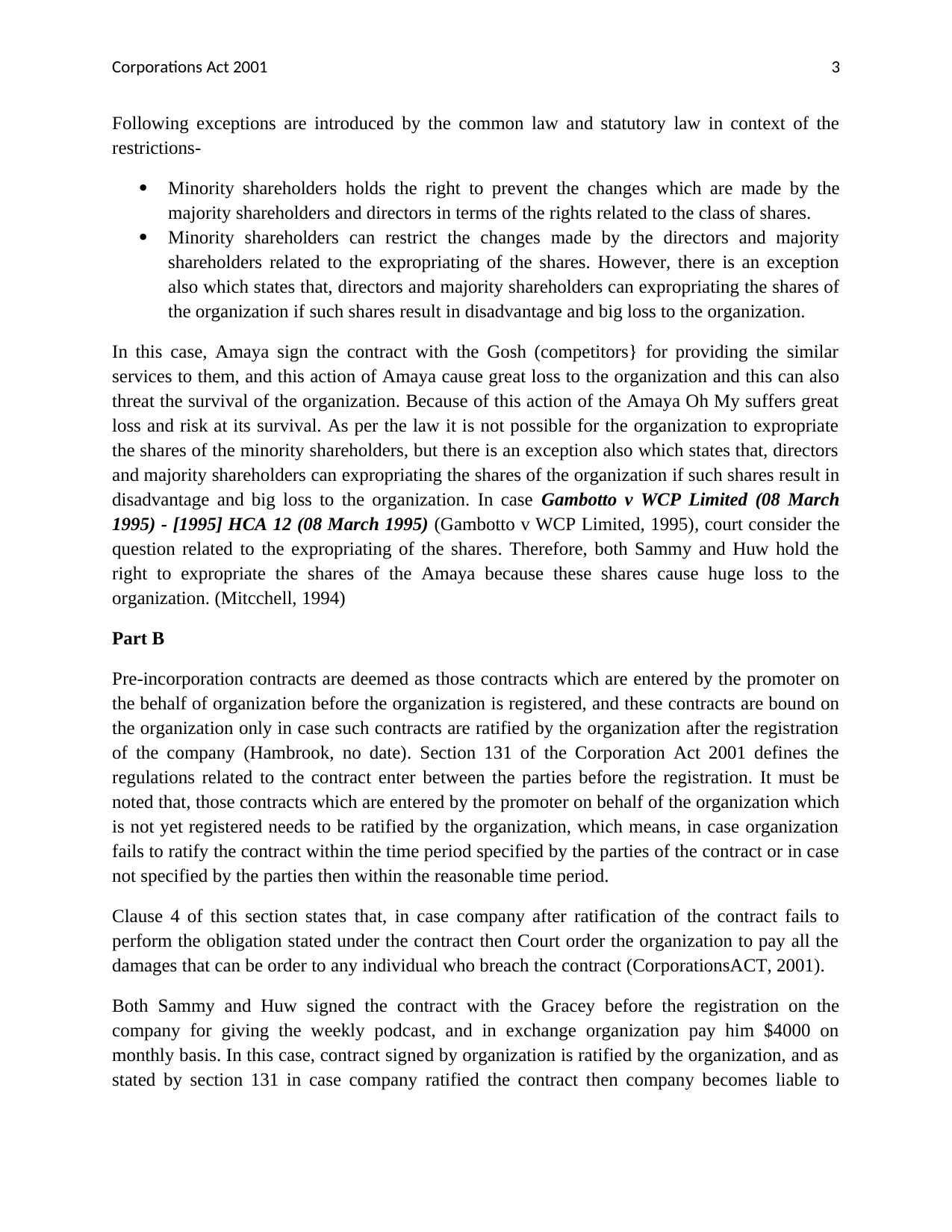
Corporations Act 2001 3
Following exceptions are introduced by the common law and statutory law in context of the
restrictions-
Minority shareholders holds the right to prevent the changes which are made by the
majority shareholders and directors in terms of the rights related to the class of shares.
Minority shareholders can restrict the changes made by the directors and majority
shareholders related to the expropriating of the shares. However, there is an exception
also which states that, directors and majority shareholders can expropriating the shares of
the organization if such shares result in disadvantage and big loss to the organization.
In this case, Amaya sign the contract with the Gosh (competitors} for providing the similar
services to them, and this action of Amaya cause great loss to the organization and this can also
threat the survival of the organization. Because of this action of the Amaya Oh My suffers great
loss and risk at its survival. As per the law it is not possible for the organization to expropriate
the shares of the minority shareholders, but there is an exception also which states that, directors
and majority shareholders can expropriating the shares of the organization if such shares result in
disadvantage and big loss to the organization. In case Gambotto v WCP Limited (08 March
1995) - [1995] HCA 12 (08 March 1995) (Gambotto v WCP Limited, 1995), court consider the
question related to the expropriating of the shares. Therefore, both Sammy and Huw hold the
right to expropriate the shares of the Amaya because these shares cause huge loss to the
organization. (Mitcchell, 1994)
Part B
Pre-incorporation contracts are deemed as those contracts which are entered by the promoter on
the behalf of organization before the organization is registered, and these contracts are bound on
the organization only in case such contracts are ratified by the organization after the registration
of the company (Hambrook, no date). Section 131 of the Corporation Act 2001 defines the
regulations related to the contract enter between the parties before the registration. It must be
noted that, those contracts which are entered by the promoter on behalf of the organization which
is not yet registered needs to be ratified by the organization, which means, in case organization
fails to ratify the contract within the time period specified by the parties of the contract or in case
not specified by the parties then within the reasonable time period.
Clause 4 of this section states that, in case company after ratification of the contract fails to
perform the obligation stated under the contract then Court order the organization to pay all the
damages that can be order to any individual who breach the contract (CorporationsACT, 2001).
Both Sammy and Huw signed the contract with the Gracey before the registration on the
company for giving the weekly podcast, and in exchange organization pay him $4000 on
monthly basis. In this case, contract signed by organization is ratified by the organization, and as
stated by section 131 in case company ratified the contract then company becomes liable to
Following exceptions are introduced by the common law and statutory law in context of the
restrictions-
Minority shareholders holds the right to prevent the changes which are made by the
majority shareholders and directors in terms of the rights related to the class of shares.
Minority shareholders can restrict the changes made by the directors and majority
shareholders related to the expropriating of the shares. However, there is an exception
also which states that, directors and majority shareholders can expropriating the shares of
the organization if such shares result in disadvantage and big loss to the organization.
In this case, Amaya sign the contract with the Gosh (competitors} for providing the similar
services to them, and this action of Amaya cause great loss to the organization and this can also
threat the survival of the organization. Because of this action of the Amaya Oh My suffers great
loss and risk at its survival. As per the law it is not possible for the organization to expropriate
the shares of the minority shareholders, but there is an exception also which states that, directors
and majority shareholders can expropriating the shares of the organization if such shares result in
disadvantage and big loss to the organization. In case Gambotto v WCP Limited (08 March
1995) - [1995] HCA 12 (08 March 1995) (Gambotto v WCP Limited, 1995), court consider the
question related to the expropriating of the shares. Therefore, both Sammy and Huw hold the
right to expropriate the shares of the Amaya because these shares cause huge loss to the
organization. (Mitcchell, 1994)
Part B
Pre-incorporation contracts are deemed as those contracts which are entered by the promoter on
the behalf of organization before the organization is registered, and these contracts are bound on
the organization only in case such contracts are ratified by the organization after the registration
of the company (Hambrook, no date). Section 131 of the Corporation Act 2001 defines the
regulations related to the contract enter between the parties before the registration. It must be
noted that, those contracts which are entered by the promoter on behalf of the organization which
is not yet registered needs to be ratified by the organization, which means, in case organization
fails to ratify the contract within the time period specified by the parties of the contract or in case
not specified by the parties then within the reasonable time period.
Clause 4 of this section states that, in case company after ratification of the contract fails to
perform the obligation stated under the contract then Court order the organization to pay all the
damages that can be order to any individual who breach the contract (CorporationsACT, 2001).
Both Sammy and Huw signed the contract with the Gracey before the registration on the
company for giving the weekly podcast, and in exchange organization pay him $4000 on
monthly basis. In this case, contract signed by organization is ratified by the organization, and as
stated by section 131 in case company ratified the contract then company becomes liable to
⊘ This is a preview!⊘
Do you want full access?
Subscribe today to unlock all pages.

Trusted by 1+ million students worldwide
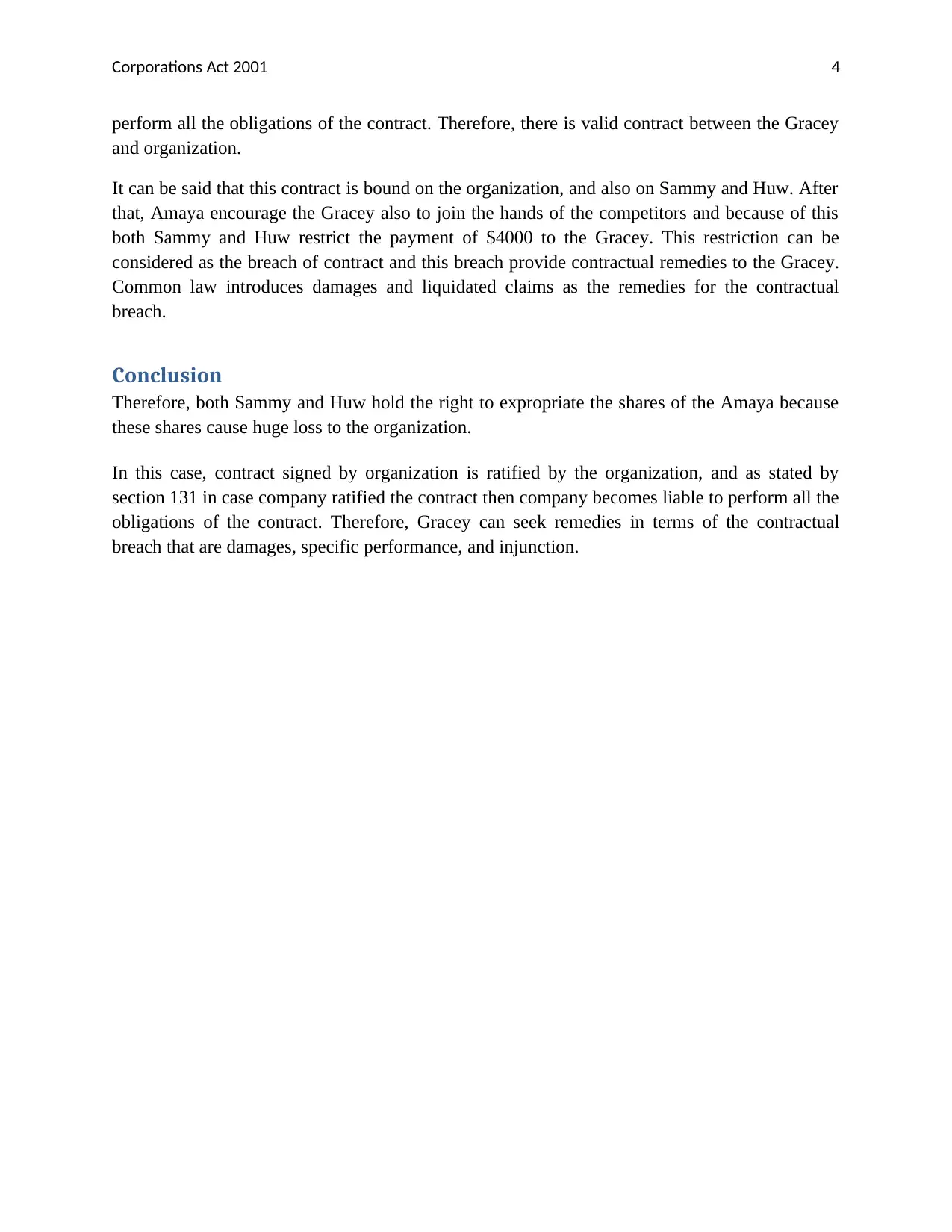
Corporations Act 2001 4
perform all the obligations of the contract. Therefore, there is valid contract between the Gracey
and organization.
It can be said that this contract is bound on the organization, and also on Sammy and Huw. After
that, Amaya encourage the Gracey also to join the hands of the competitors and because of this
both Sammy and Huw restrict the payment of $4000 to the Gracey. This restriction can be
considered as the breach of contract and this breach provide contractual remedies to the Gracey.
Common law introduces damages and liquidated claims as the remedies for the contractual
breach.
Conclusion
Therefore, both Sammy and Huw hold the right to expropriate the shares of the Amaya because
these shares cause huge loss to the organization.
In this case, contract signed by organization is ratified by the organization, and as stated by
section 131 in case company ratified the contract then company becomes liable to perform all the
obligations of the contract. Therefore, Gracey can seek remedies in terms of the contractual
breach that are damages, specific performance, and injunction.
perform all the obligations of the contract. Therefore, there is valid contract between the Gracey
and organization.
It can be said that this contract is bound on the organization, and also on Sammy and Huw. After
that, Amaya encourage the Gracey also to join the hands of the competitors and because of this
both Sammy and Huw restrict the payment of $4000 to the Gracey. This restriction can be
considered as the breach of contract and this breach provide contractual remedies to the Gracey.
Common law introduces damages and liquidated claims as the remedies for the contractual
breach.
Conclusion
Therefore, both Sammy and Huw hold the right to expropriate the shares of the Amaya because
these shares cause huge loss to the organization.
In this case, contract signed by organization is ratified by the organization, and as stated by
section 131 in case company ratified the contract then company becomes liable to perform all the
obligations of the contract. Therefore, Gracey can seek remedies in terms of the contractual
breach that are damages, specific performance, and injunction.
Paraphrase This Document
Need a fresh take? Get an instant paraphrase of this document with our AI Paraphraser
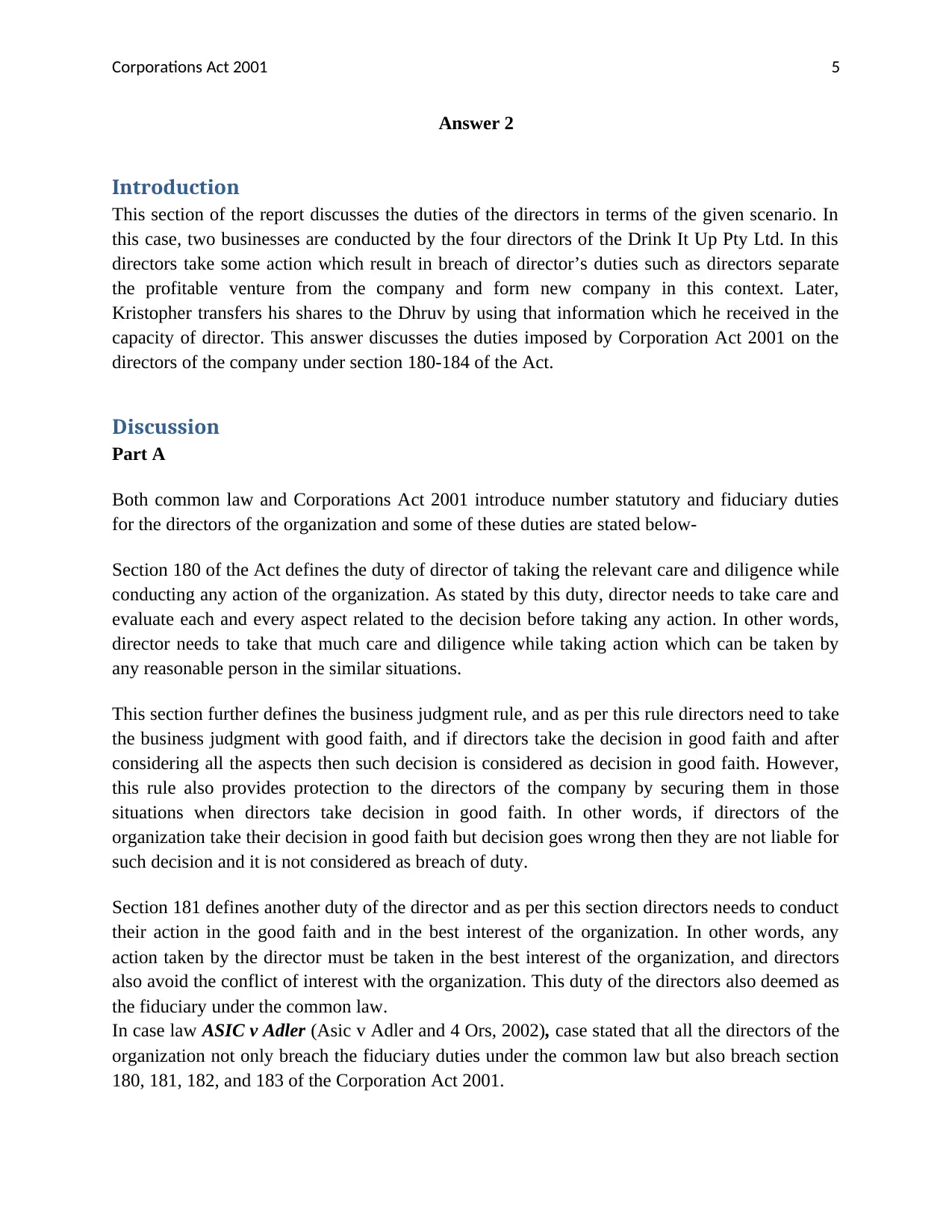
Corporations Act 2001 5
Answer 2
Introduction
This section of the report discusses the duties of the directors in terms of the given scenario. In
this case, two businesses are conducted by the four directors of the Drink It Up Pty Ltd. In this
directors take some action which result in breach of director’s duties such as directors separate
the profitable venture from the company and form new company in this context. Later,
Kristopher transfers his shares to the Dhruv by using that information which he received in the
capacity of director. This answer discusses the duties imposed by Corporation Act 2001 on the
directors of the company under section 180-184 of the Act.
Discussion
Part A
Both common law and Corporations Act 2001 introduce number statutory and fiduciary duties
for the directors of the organization and some of these duties are stated below-
Section 180 of the Act defines the duty of director of taking the relevant care and diligence while
conducting any action of the organization. As stated by this duty, director needs to take care and
evaluate each and every aspect related to the decision before taking any action. In other words,
director needs to take that much care and diligence while taking action which can be taken by
any reasonable person in the similar situations.
This section further defines the business judgment rule, and as per this rule directors need to take
the business judgment with good faith, and if directors take the decision in good faith and after
considering all the aspects then such decision is considered as decision in good faith. However,
this rule also provides protection to the directors of the company by securing them in those
situations when directors take decision in good faith. In other words, if directors of the
organization take their decision in good faith but decision goes wrong then they are not liable for
such decision and it is not considered as breach of duty.
Section 181 defines another duty of the director and as per this section directors needs to conduct
their action in the good faith and in the best interest of the organization. In other words, any
action taken by the director must be taken in the best interest of the organization, and directors
also avoid the conflict of interest with the organization. This duty of the directors also deemed as
the fiduciary under the common law.
In case law ASIC v Adler (Asic v Adler and 4 Ors, 2002), case stated that all the directors of the
organization not only breach the fiduciary duties under the common law but also breach section
180, 181, 182, and 183 of the Corporation Act 2001.
Answer 2
Introduction
This section of the report discusses the duties of the directors in terms of the given scenario. In
this case, two businesses are conducted by the four directors of the Drink It Up Pty Ltd. In this
directors take some action which result in breach of director’s duties such as directors separate
the profitable venture from the company and form new company in this context. Later,
Kristopher transfers his shares to the Dhruv by using that information which he received in the
capacity of director. This answer discusses the duties imposed by Corporation Act 2001 on the
directors of the company under section 180-184 of the Act.
Discussion
Part A
Both common law and Corporations Act 2001 introduce number statutory and fiduciary duties
for the directors of the organization and some of these duties are stated below-
Section 180 of the Act defines the duty of director of taking the relevant care and diligence while
conducting any action of the organization. As stated by this duty, director needs to take care and
evaluate each and every aspect related to the decision before taking any action. In other words,
director needs to take that much care and diligence while taking action which can be taken by
any reasonable person in the similar situations.
This section further defines the business judgment rule, and as per this rule directors need to take
the business judgment with good faith, and if directors take the decision in good faith and after
considering all the aspects then such decision is considered as decision in good faith. However,
this rule also provides protection to the directors of the company by securing them in those
situations when directors take decision in good faith. In other words, if directors of the
organization take their decision in good faith but decision goes wrong then they are not liable for
such decision and it is not considered as breach of duty.
Section 181 defines another duty of the director and as per this section directors needs to conduct
their action in the good faith and in the best interest of the organization. In other words, any
action taken by the director must be taken in the best interest of the organization, and directors
also avoid the conflict of interest with the organization. This duty of the directors also deemed as
the fiduciary under the common law.
In case law ASIC v Adler (Asic v Adler and 4 Ors, 2002), case stated that all the directors of the
organization not only breach the fiduciary duties under the common law but also breach section
180, 181, 182, and 183 of the Corporation Act 2001.
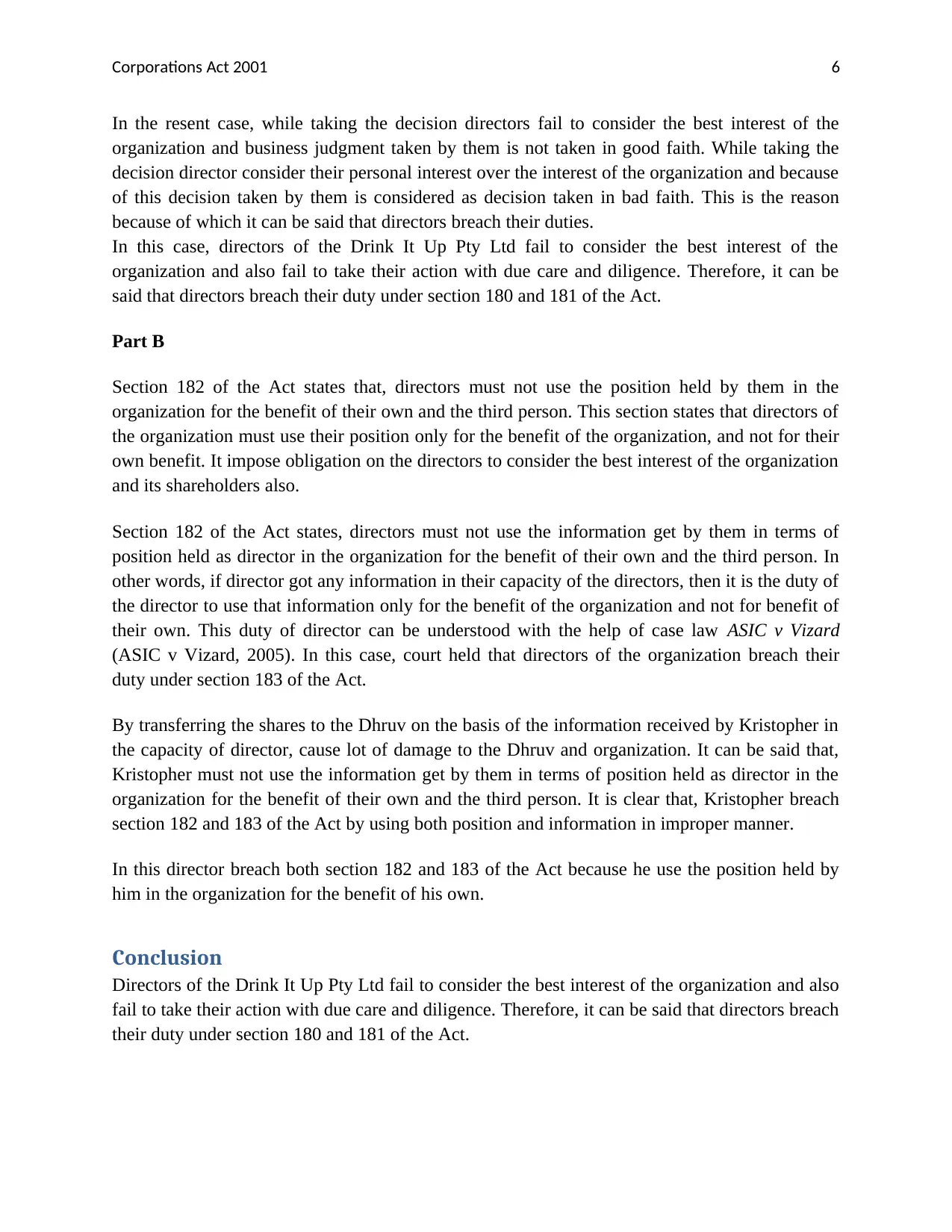
Corporations Act 2001 6
In the resent case, while taking the decision directors fail to consider the best interest of the
organization and business judgment taken by them is not taken in good faith. While taking the
decision director consider their personal interest over the interest of the organization and because
of this decision taken by them is considered as decision taken in bad faith. This is the reason
because of which it can be said that directors breach their duties.
In this case, directors of the Drink It Up Pty Ltd fail to consider the best interest of the
organization and also fail to take their action with due care and diligence. Therefore, it can be
said that directors breach their duty under section 180 and 181 of the Act.
Part B
Section 182 of the Act states that, directors must not use the position held by them in the
organization for the benefit of their own and the third person. This section states that directors of
the organization must use their position only for the benefit of the organization, and not for their
own benefit. It impose obligation on the directors to consider the best interest of the organization
and its shareholders also.
Section 182 of the Act states, directors must not use the information get by them in terms of
position held as director in the organization for the benefit of their own and the third person. In
other words, if director got any information in their capacity of the directors, then it is the duty of
the director to use that information only for the benefit of the organization and not for benefit of
their own. This duty of director can be understood with the help of case law ASIC v Vizard
(ASIC v Vizard, 2005). In this case, court held that directors of the organization breach their
duty under section 183 of the Act.
By transferring the shares to the Dhruv on the basis of the information received by Kristopher in
the capacity of director, cause lot of damage to the Dhruv and organization. It can be said that,
Kristopher must not use the information get by them in terms of position held as director in the
organization for the benefit of their own and the third person. It is clear that, Kristopher breach
section 182 and 183 of the Act by using both position and information in improper manner.
In this director breach both section 182 and 183 of the Act because he use the position held by
him in the organization for the benefit of his own.
Conclusion
Directors of the Drink It Up Pty Ltd fail to consider the best interest of the organization and also
fail to take their action with due care and diligence. Therefore, it can be said that directors breach
their duty under section 180 and 181 of the Act.
In the resent case, while taking the decision directors fail to consider the best interest of the
organization and business judgment taken by them is not taken in good faith. While taking the
decision director consider their personal interest over the interest of the organization and because
of this decision taken by them is considered as decision taken in bad faith. This is the reason
because of which it can be said that directors breach their duties.
In this case, directors of the Drink It Up Pty Ltd fail to consider the best interest of the
organization and also fail to take their action with due care and diligence. Therefore, it can be
said that directors breach their duty under section 180 and 181 of the Act.
Part B
Section 182 of the Act states that, directors must not use the position held by them in the
organization for the benefit of their own and the third person. This section states that directors of
the organization must use their position only for the benefit of the organization, and not for their
own benefit. It impose obligation on the directors to consider the best interest of the organization
and its shareholders also.
Section 182 of the Act states, directors must not use the information get by them in terms of
position held as director in the organization for the benefit of their own and the third person. In
other words, if director got any information in their capacity of the directors, then it is the duty of
the director to use that information only for the benefit of the organization and not for benefit of
their own. This duty of director can be understood with the help of case law ASIC v Vizard
(ASIC v Vizard, 2005). In this case, court held that directors of the organization breach their
duty under section 183 of the Act.
By transferring the shares to the Dhruv on the basis of the information received by Kristopher in
the capacity of director, cause lot of damage to the Dhruv and organization. It can be said that,
Kristopher must not use the information get by them in terms of position held as director in the
organization for the benefit of their own and the third person. It is clear that, Kristopher breach
section 182 and 183 of the Act by using both position and information in improper manner.
In this director breach both section 182 and 183 of the Act because he use the position held by
him in the organization for the benefit of his own.
Conclusion
Directors of the Drink It Up Pty Ltd fail to consider the best interest of the organization and also
fail to take their action with due care and diligence. Therefore, it can be said that directors breach
their duty under section 180 and 181 of the Act.
⊘ This is a preview!⊘
Do you want full access?
Subscribe today to unlock all pages.

Trusted by 1+ million students worldwide
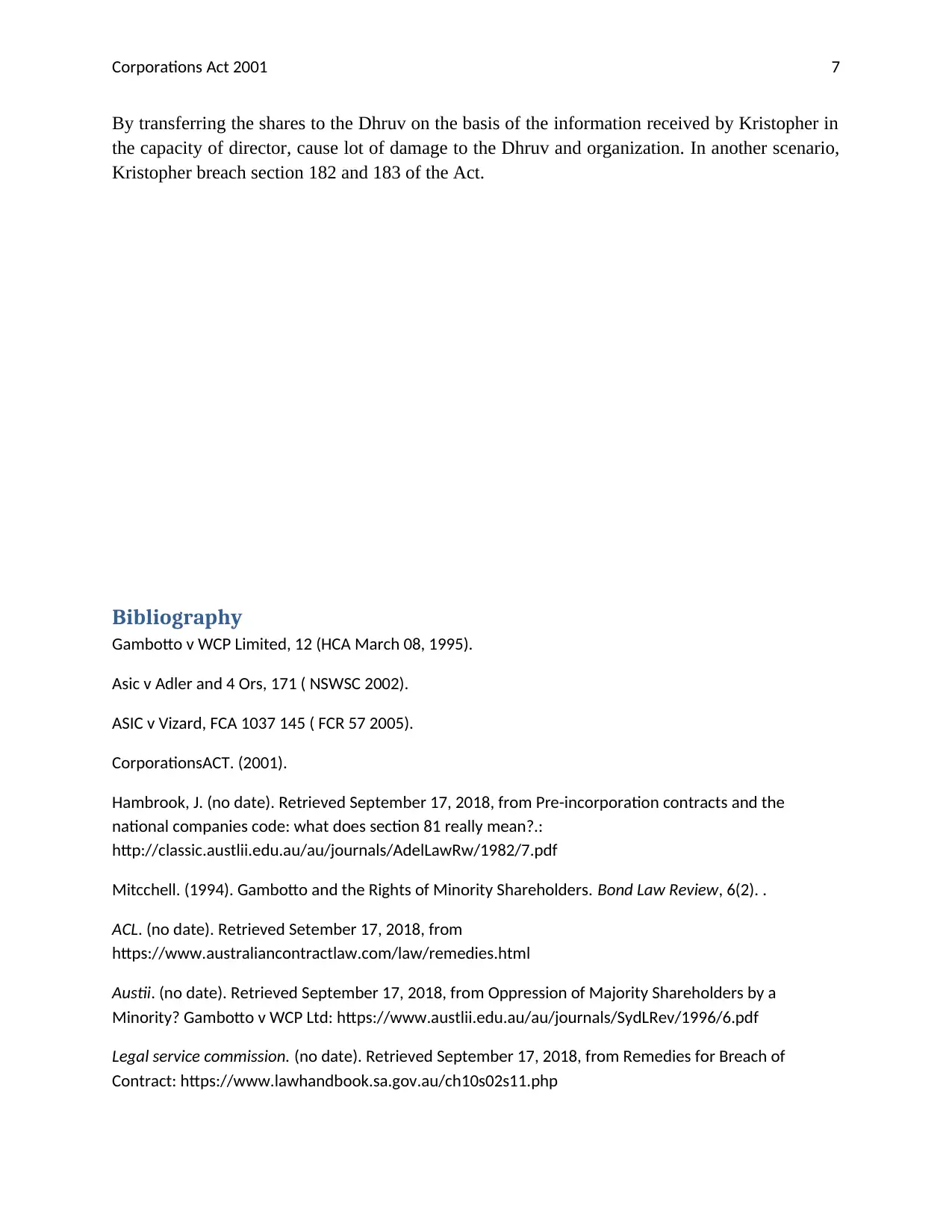
Corporations Act 2001 7
By transferring the shares to the Dhruv on the basis of the information received by Kristopher in
the capacity of director, cause lot of damage to the Dhruv and organization. In another scenario,
Kristopher breach section 182 and 183 of the Act.
Bibliography
Gambotto v WCP Limited, 12 (HCA March 08, 1995).
Asic v Adler and 4 Ors, 171 ( NSWSC 2002).
ASIC v Vizard, FCA 1037 145 ( FCR 57 2005).
CorporationsACT. (2001).
Hambrook, J. (no date). Retrieved September 17, 2018, from Pre-incorporation contracts and the
national companies code: what does section 81 really mean?.:
http://classic.austlii.edu.au/au/journals/AdelLawRw/1982/7.pdf
Mitcchell. (1994). Gambotto and the Rights of Minority Shareholders. Bond Law Review, 6(2). .
ACL. (no date). Retrieved Setember 17, 2018, from
https://www.australiancontractlaw.com/law/remedies.html
Austii. (no date). Retrieved September 17, 2018, from Oppression of Majority Shareholders by a
Minority? Gambotto v WCP Ltd: https://www.austlii.edu.au/au/journals/SydLRev/1996/6.pdf
Legal service commission. (no date). Retrieved September 17, 2018, from Remedies for Breach of
Contract: https://www.lawhandbook.sa.gov.au/ch10s02s11.php
By transferring the shares to the Dhruv on the basis of the information received by Kristopher in
the capacity of director, cause lot of damage to the Dhruv and organization. In another scenario,
Kristopher breach section 182 and 183 of the Act.
Bibliography
Gambotto v WCP Limited, 12 (HCA March 08, 1995).
Asic v Adler and 4 Ors, 171 ( NSWSC 2002).
ASIC v Vizard, FCA 1037 145 ( FCR 57 2005).
CorporationsACT. (2001).
Hambrook, J. (no date). Retrieved September 17, 2018, from Pre-incorporation contracts and the
national companies code: what does section 81 really mean?.:
http://classic.austlii.edu.au/au/journals/AdelLawRw/1982/7.pdf
Mitcchell. (1994). Gambotto and the Rights of Minority Shareholders. Bond Law Review, 6(2). .
ACL. (no date). Retrieved Setember 17, 2018, from
https://www.australiancontractlaw.com/law/remedies.html
Austii. (no date). Retrieved September 17, 2018, from Oppression of Majority Shareholders by a
Minority? Gambotto v WCP Ltd: https://www.austlii.edu.au/au/journals/SydLRev/1996/6.pdf
Legal service commission. (no date). Retrieved September 17, 2018, from Remedies for Breach of
Contract: https://www.lawhandbook.sa.gov.au/ch10s02s11.php
Paraphrase This Document
Need a fresh take? Get an instant paraphrase of this document with our AI Paraphraser

Corporations Act 2001 8
1 out of 8
Related Documents
Your All-in-One AI-Powered Toolkit for Academic Success.
+13062052269
info@desklib.com
Available 24*7 on WhatsApp / Email
![[object Object]](/_next/static/media/star-bottom.7253800d.svg)
Unlock your academic potential
Copyright © 2020–2025 A2Z Services. All Rights Reserved. Developed and managed by ZUCOL.





